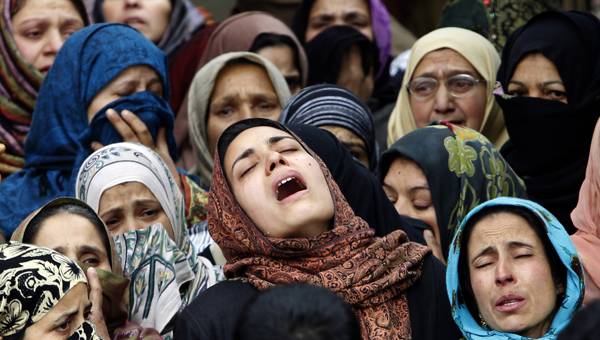
“The violated Kashmiri women ask what action has been taken to enforce the writ of the Universal Declaration of Human Rights and the Declaration on the elimination of violence against women,” Fai concluded.
One more International Women’s Day: One more year of death, destruction, and rape in Kashmir: Dr. Fai
WASHINGTON ( Web News )
Dr. Ghulam Nabi Fai, Chairman, ‘World Forum for Peace & Justice’ on the eve of ‘International Women’s Day’ has stated that on behalf of the women and children of the world who continue to be the innocent victims they hope that the ‘Platform of Action’ which was adopted by the UN during the ‘Fourth World Conference on Women’ on September 15, 1995, suggest implementation of a special program to rehabilitate the women and children of all conflicts in all situations.
He further stated, “We also hope that the sixty-seventh session of the ‘Commission on the Status of Women’ which started today (March 6 – 17, 2023) at the United Nations will put these issues in a high priority. And, in particular, the women of Kashmir still have confidence in the mechanism of the United Nations and its sense of justice. But there are limits even to hope. They are often assailed by despair because of the half-hearted response of the international community to their tragic situation. Unfortunately, the passivity and the silence of the world powers of course unwittingly, have given the sense of total impunity to the occupation authority in Kashmir.”
Fai cited the reports of the United Nations High Commissioner on Human Rights (UNHCHR) on Kashmir that were issued on June 14, 2018 & July 8, 2019. The reports contained graphic documentation of human rights violations being committed by the Indian military and paramilitary forces in Jammu & Kashmir. It marked a significant step towards greater international recognition of serious abuses committed against Kashmiris by the Indian army.
The reports further illustrated that “One significant case that illustrates the state’s failure to investigate and prosecute allegations of sexual violence and addressing impunity for sexual crimes in Kashmir is the Kunan-Poshpora mass rape, which took place 27 years ago and for which attempts to seek justice have been denied and blocked over the years by the authorities at different levels.” But, unfortunately, even these reports failed to take the veil of secrecy off of India’s crimes against humanity, Fai added.
Fai drew the attention of the United Nations to another report issued by The New Delhi based NGO, ‘The Citizen Bureau’, published in ‘The Daily Citizen’ on February 24, 2014: “The rape of women in Kunan-Poshpora villages in the Kupwara district of Jammu and Kashmir is a 23 old saga of complicity, duplicity, and a massive cover up in which powerful institutions like the Army, the media, and the state and central governments were involved. The victim’s quest for justice has been deliberately blocked, with the perpetrators of the terrible crime getting completely away as a result.”
“Do you remember Kunan-Poshpora” documentary evidence of five brave Kashmiri women scholars wrote these words on page 1, “This book is about one night in two villages in Kashmir. It is about a night that has refused to end for 24 long years, a night that holds stories of violations, injustice, oppression and falsehood, as well as acts of courage, bravery and truth. This book is about Kunan-Poshpora.”
Devina Neogi, Ramaiah Public Policy Officer, wrote in ‘Journal of International Women’s Studies,’ in May 2022. “The conflict in Kashmir has created havoc in the lives of the people, and the women have suffered the most, from physically auscultation to being raped, from losing their family members to being tortured in jails.”
Zohra Batul, tried to shake the conscience of the world leaders by writing in the blog of London School of Economics, namely, Engenderings, “The reality of Indian democracy is most conspicuously exposed in Kashmir, a truth that no nationalist Indian wants to hear.”
Amrit Wilson wrote in ‘The Peninsula (July 4, 2014): ‘When will the Kashmiri nightmare end?’ She added “Horrific violence has been faced by the women, with rape used as a “weapon of war to punish, intimidate, coerce, humiliate and degrade”. “The Armed Forces Special Powers Act (AFSPA), imposed in 1958 in all so-called ‘disturbed areas’ of India, provides the army and paramilitaries with almost total impunity, enabling them to arrest people without a warrant and on mere suspicion of their planning a terrorist act and allowing the security forces to “fire upon or otherwise use force even to the causing of death”.
“Are these reports and revelations not enough to shake the conscience of the world powers and the distinguished members of the Human Rights Council? The perpetrator of this state policy, India, has the temerity to sit not only in the Human Rights Council but also in the Security Council. Why does the international community not condemn India?” Fai asked.
Dr. Fai spelled out that currently the policy of the world powers, including the United States has led the Indian Government to believe that all it needs is some political maneuvering to dissipate foreign concern over the appalling situation in Kashmir. This tilt towards India, Fai elucidated has been caused by the prospect of profitable American investments in that large country. Even from a purely economic perspective, if not from concern over peace, genuine democracy and observance of human rights, the restoration of normalcy in South Asia deserves to be a policy goal for the world’s only superpower – the United States. The Kashmir dispute being the key cause of conflict, its marginalization can hardly serve long-term American interests.
“The violated Kashmiri women ask what action has been taken to enforce the writ of the Universal Declaration of Human Rights and the Declaration on the elimination of violence against women,” Fai concluded.
